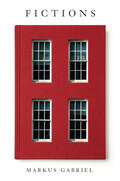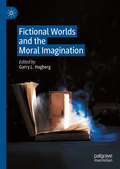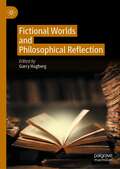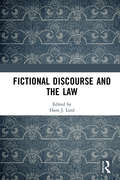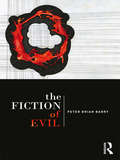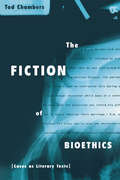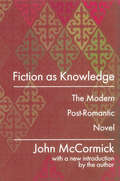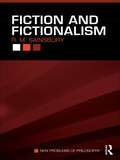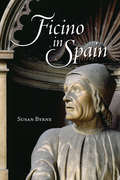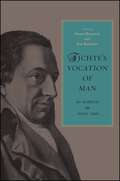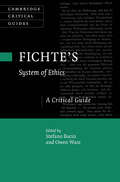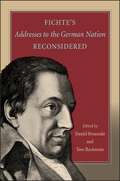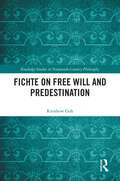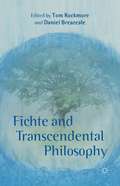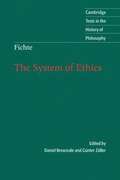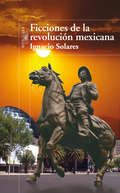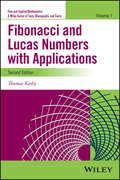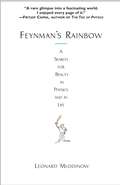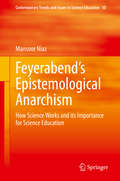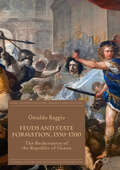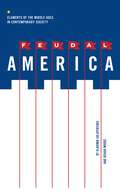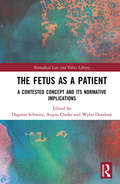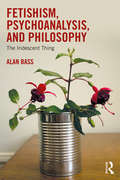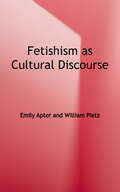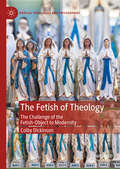- Table View
- List View
Fictions
by Markus GabrielFrom Ancient philosophy to contemporary theories of fiction, it is a common practice to relegate illusory appearances to the realm of the non-existent, like shadows on the wall of Plato’s cave. Contrary to this traditional mode of drawing a metaphysical distinction between reality and fiction, Markus Gabriel argues that the realm of the illusory, fictional, imaginary, and conceptually indeterminate is as real as it gets.Being in touch with reality need not and cannot require that we overcome appearances in order to grasp a meaningless reality which exists ‘out there,’ outside and maybe even beyond our minds. Human mindedness (Geist) exists in the mode of fictions through which we achieve self-consciousness. This novel approach provides a fresh perspective on our existence as subjects who lead their lives in the light of self-conceptions.Fictions also develops a social ontology according to which the social unfolds as a constant renegotiation of dissent, of different points of view onto the same reality. Thus, we cannot ever hope to ground human society in a fiction-free realm of objective transactions. However, this does not mean that truth and reality are somehow outdated concepts. On the contrary, we need to enlarge our conception of reality so that it fully encompasses ourselves as specifically minded social animals.This major new work of philosophy will be of interest to students and scholars throughout the humanities and to anyone interested in contemporary philosophy and social thought.
Fictional Worlds and the Moral Imagination
by Garry L. HagbergThis edited collection investigates the kinds of moral reflection we can undertake within the imaginative worlds of literature. In philosophical contexts of ethical inquiry we can too easily forget that literary experience can play an important role in the cultivation of our ethical sensibilities. Because our ethical lives are conducted in the real world, fictional representations of this world can appear removed from ethical contemplation. However, as this stimulating volume shows, the dichotomy between fact and fiction cannot be so easily categorised. Moral perception, moral sensitivity, and ethical understanding more broadly, may all be developed in a unique way through our imaginative life in fiction. Moral quandaries are often presented in literature in ways more linguistically precise and descriptively complete than the ones we encounter in life, whilst simultaneously offering space for contemplation. The twelve original chapters in this volume examine literary texts – including theatre and film – in this light, and taken together they show how serious reflection within fictional worlds can lead to a depth of humane insight. The topics explored include: the subtle ways that knowledge can function as a virtue; issues concerning our relations to and understanding of each other; the complex intertwining of virtues and vices in the modern world; and the importance of bringing to light and reconsidering ethical presuppositions. With an appreciation of the importance of richly contextualized particularity and the power of descriptive acuity, the volume maps out the territory that philosophical reflection and literary engagement share.
Fictional Worlds and Philosophical Reflection
by Garry HagbergThis edited collection investigates the kinds of philosophical reflection we can undertake in the imaginative worlds of literature. Opening with a look into the relations between philosophical thought and literary interpretation, the volume proceeds through absorbing discussions of the ways we can see life through the lens of literature, the relations between philosophical saying and literary showing, and some ways we can see the literary past philosophically and assess its significance for the present. Taken as a whole, the volume shows how imagined contexts can be a source of knowledge, a source of conceptual clarification, and a source of insight and understanding. And because philosophical thinking is undertaken, after all, in words, a heightened sensitivity to the precise employments of our words – particularly philosophically central words such as truth, reality, perception, knowledge, selfhood, illusion, understanding, falsehood – can bring a clarity and a refreshed sense of the life that our words take on in fully-described contexts of usage. And in these imagined contexts we can also see more acutely and deeply into the meaning of words about words – metaphor and figurative tropes, verbal coherence, intelligibility, implication, sense, and indeed the word “meaning” itself. Moving from a philosophical issue into a literary world in which the central concepts of that issue are in play can thus enrich our comprehension of those concepts and, in the strongest cases, substantively change the way we see them. With a combination of conceptual acuity and literary sensitivity, this volume maps out some of the territory that philosophical reflection and literary engagement share.
Fictional Discourse and the Law
by Hans J. LindDrawing on insights from literary theory and analytical philosophy, this book analyzes the intersection of law and literature from the distinct and unique perspective of fictional discourse. Pursuing an empirical approach, and using examples that range from Victorian literature to the current judicial treatment of rap music, the volume challenges the prevailing fact–fiction dichotomy in legal theory and practice by providing a better understanding of the peculiarities of legal fictionality, while also contributing further material to fictional theory’s endeavor to find a transdisciplinary valid criterion for a definition of fictional discourse. Following the basic presumptions of the early law-as-literature movement, past approaches have mainly focused on textuality and narrativity as the common denominators of law and literature, and have largely ignored the topic of fictionality. This volume provides a much needed analysis of this gap. The book will be of interest to scholars of legal theory, jurisprudence and legal writing, along with literature scholars and students of literature and the humanities.
The Fiction of Evil
by Peter Brian BarryWhat makes someone an evil person? How are evil people different from merely bad people? Do evil people really exist? Can we make sense of evil people if we mythologize them? Do evil people take pleasure in the suffering of others? Can evil people be redeemed?Peter Brian Barry answers these questions by examining a wide range of works from renowned authors, including works of literature by Kazuo Ishiguro, Mark Twain, Edgar Allan Poe, Herman Melville, and Oscar Wilde alongside classic works of philosophy by Nietzsche and Aristotle. By considering great texts from literature and philosophy, Barry examines whether evil is merely a fiction.The Fiction of Evil explores how the study of literature can contribute to the study of metaphysics and ethics and it is essential reading for those studying the concept of evil or philosophy of literature at undergraduate level.
The Fiction of Bioethics (Reflective Bioethics)
by Tod ChambersTod Chambers suggests that literary theory is a crucial component in the complete understanding of bioethics. The Fiction of Bioethics explores the medical case study and distills the idea that bioethicists study real-life cases, while philosophers contemplate fictional accounts.
Fiction as Knowledge: Modern Post-romantic Novel
by John McCormickCritics of fiction have long been aware that the romantic movement in Europe and America gave a powerful impulse to the art of fiction. The exact nature of that impulse has resisted analysis like so much associated with romanticism. In Fiction as Knowledge John McCormick reaches for precision, proposing that much of the vitality of modern fiction derives from romantic conceptions of history which made available to fiction not merely historical subject matter, but new perceptions of reality, present and past, that pervade the work of many of the greatest writers of the post-romantic period.Beginning with Herder and Hegel, McCormick describes those qualities in historical thought that were revolutionary in the early nineteenth century and rich in meaning for the future. Most prominent of these was the emergence of the idea of individuality, not only in society but also in history. The author demonstrates the vitality of the romantic impulse in the work of seven major novelists of the twentieth century. Marcel Proust's apprehensions of nature in his great novel are seen as Wordsworthian, while as the novel unfolds, history in the form of event and system of organization comes to dominate and to offer a paradigm of the workings of the post-romantic historical imagination. William Faulkner and Andr Malraux are shown to confront history directly, although they do not write "historical" fiction. Herman Broch, Robert Musil, and Henri de Montherlant, uncomfortable with traditional romantic attitudes, still make fullest use of Romantic historical insight to extend the range of fiction as knowledge. Ernest Hemingway, by contrast, is seen as intuitive, a pure product of his novelist's intelligence as opposed to his latter-day romantic anti-intellectualism.Fiction as Knowledge supplies critical insight into the form of the novel as well as into the seven novelists under discussion. Not least, the book is a warning against contemporary anti-historical bias and an appeal to the cultivation of historical consciousness. John McCormick is Professor Emeritus of Comparative Literature at Rutgers University, and Honorary Fellow of English and Literature at the University of York. He is the author of George Santayana: A Biography, Catastrophe and Imagination, and The Middle Distance, by Transaction.
Fiction and Fictionalism (New Problems of Philosophy)
by R. M. SainsburyAre fictional characters such as Sherlock Holmes real? What can fiction tell us about the nature of truth and reality? In this excellent introduction to the problem of fictionalism R. M. Sainsbury covers the following key topics: what is fiction? realism about fictional objects, including the arguments that fictional objects are real but non-existent; real but non-factual; real but non-concrete the relationship between fictional characters and non-actual worlds fictional entities as abstract artefacts fiction and intentionality and the problem of irrealism fictionalism about possible worlds moral fictionalism. R. M. Sainsbury makes extensive use of examples from fiction, such as Sherlock Holmes, Anna Karenina and Madame Bovary and examines the work of philosophers who have made significant contributions to the topic, including Meinong, David Lewis, and Bas Van Fraassen. Additional features include chapter summaries, annotated further reading and a glossary of technical terms, making Fiction and Fictionalism ideal for those coming to the issue for the first time.
Ficino in Spain
by Susan ByrneAs the first translator of Plato's complete works into Latin, the Florentine writer Marsilio Ficino (1433-99) and his blend of Neoplatonic and Hermetic philosophy were fundamental to the intellectual atmosphere of the Renaissance. In Spain, his works were regularly read, quoted, and referenced, at least until the nineteenth century, when literary critics and philosophers wrote him out of the history of early modern Spain.In Ficino in Spain, Susan Byrne uses textual and bibliographic evidence to show the pervasive impact of Ficino's writings and translations on the Spanish Renaissance. Cataloguing everything from specific mentions of his name in major texts to glossed volumes of his works in Spanish libraries, Byrne shows that Spanish writers such as Miguel de Cervantes, Lope de Vega, Bartolomé de las Casas, and Garcilaso de la Vega all responded to Ficino and adapted his imagery for their own works. An important contribution to the study of Spanish literature and culture from the fifteenth to the seventeenth centuries, Ficino in Spain recovers the role that Hermetic and Neoplatonic thought played in the world of Spanish literature.
Fichte's Vocation of Man: New Interpretive and Critical Essays
by Daniel Breazeale; Tom RockmoreWritten for a general audience during a period of intense controversy in the German philosophical community, J. G. Fichte's short book The Vocation of Man (1800) is both an introduction to and a defense of his philosophical system, and is one of the best-known contributions to German Idealism. This collection of new essays reflects a wide and instructive variety of philosophical and hermeneutic approaches, which combine to cast new light upon Fichte's familiar text. The contributors highlight some of the overlooked complexities and implications of The Vocation of Man and situate it firmly within the intellectual context within which it was originally written, relating it to the positions of Kant, Hegel, Schelling, Schlegel, Jacobi, and others. In addition, the essays relate the text to issues of contemporary concern such as the limits of language, the character of rational agency, the problem of evil, the relation of theoretical knowledge to practical belief, and the dialectic of judgment.
Fichte's System of Ethics: A Critical Guide (Cambridge Critical Guides)
by Stefano Bacin Owen WareThe System of Ethics was published at the height of Fichte's academic career and marks the culmination of his philosophical development in Jena. Much more than a treatise on ethics narrowly construed, the System of Ethics presents a unified synthesis of Fichte's core philosophical ideas, including the principle I-hood, self-activity and self-consciousness, and also contains his most detailed treatment of action and agency. This volume brings together an international group of leading scholars on Fichte, and is the first of its kind in English to offer critical and interpretive perspectives on this work, covering topics such as normativity, belief, justification, desire, duty, and the ethical life. It will be an essential guide for scholars wanting to deepen their understanding of Fichte's ethical thought, as well as for those interested in the history of ethics more broadly.
Fichte's Addresses to the German Nation Reconsidered
by Daniel Breazeale; Tom RockmoreOne of J. G. Fichte's best-known works, Addresses to the German Nation is based on a series of speeches he gave in Berlin when the city was under French occupation. They feature Fichte's diagnosis of his own era in European history as well as his call for a new sense of German national identity, based upon a common language and culture rather than "blood and soil." These speeches, often interpreted as key documents in the rise of modern nationalism, also contain Fichte's most sustained reflections on pedagogical issues, including his ideas for a new egalitarian system of Prussian national education. The contributors' reconsideration of the speeches deal not only with technical philosophical issues such as the relationship between language and identity, and the tensions between universal and particular motifs in the text, but also with issues of broader concern, including education, nationalism, and the connection between morality and politics.
Fichte on Free Will and Predestination (Routledge Studies in Nineteenth-Century Philosophy)
by Kienhow GohThe book explains Fichte’s position on free will and predestination, including its rationale and significance. It argues that Fichte affirms both free will and predestination and explains how he purports to do so without contradiction. The book presents Fichte‘s position as a form of compatibilism that has not yet been explored in the literature. Due to early rationalist convictions, Fichte is as much concerned with reconciling freedom with a logical and a theological determinism as he is with a causal determinism. He sees in Kant’s novel concept of a pure practical reason a new form of rationalism, one consisting of a system of moral rather than natural necessitating grounds. At the same time, he adopts a more radically libertarian stance on free will than Kant. Every member in a sequence of free actions is a “first and absolute member” and could be other than it is given the same antecedent natural events and natural laws. The interest of Fichte as a theorist of freedom lies in how he brings together freedom and predetermination in a way that challenges our assumption about their mutual exclusivity. The book provides an overview of Fichte’s philosophical system—the so-called “Doctrine of Science”—from 1793-1800 with the aim of contextualizing his theory of free agency and destiny. In doing so, it sheds light on how consideration of these issues in turn shapes the system. Fichte on Free Will and Predestination will be of interest to scholars and advanced students working on Fichte’s philosophy, the history of modern philosophy, German Idealism, and the history of the philosophical issue of free will.
Fichte And Transcendental Philosophy
by Tom Rockmore Daniel BreazealeWith renewed attention to German idealism in general and to Fichte in particular, this timely collection of new papers will be of interest to anyone concerned with transcendental philosophy, German idealism, modern German philosophy and transcendental arguments.
Fichte: The System Of Ethics
by Daniel Breazeale Guenter Zöller Johann Gottlieb FichteFichte's System of Ethics, published in 1798, is at once the most accessible presentation of its author's comprehensive philosophical project, The Science of Knowledge or Wissenschaftslehre, and the most important work in moral philosophy written between Kant and Hegel. Fichte's ethics integrates the discussion of our moral duties into the systematic framework of a transcendental theory of the human subject. Its major philosophical themes include the practical nature of self-consciousness, the relation between reason and volition, the essential role of the drives in human willing, the possibility of changing the natural world, the reality of one's own body, the reality of other human beings, and the practical necessity of social relations between human beings. This volume offers a translation of the work together with an introduction that sets it in its philosophical and historical contexts.
Ficciones de la revolución mexicana
by Ignacio SolaresColección de cuentos en los que pasan Madero, Huerta, Felipe Ángeles, Rodolfo Fierro, Carranza, Obregón, León Toral. La magistral pluma de Ignacio Solares, ganador del Premio Fernando Benítez, nos acerca a un personaje histórico fundamental de México. De Madero y Huerta a Felipe Ángeles y Rodolfo Fierro, pasando por Carranza, Obregón, León Toral y muchos otros personajes, en cada cuento Ignacio Solares inquieta, deslumbra, sorprende a sus lectores con tramas en las que el destino reparte los balazos de manera distinta a la que consignan las versiones oficiales, los hechos ya no coinciden con las efemérides y los infiernos privados abren sus puertas al público, por si hubiera quien se atreva a trasponerlas. Revolución es una palabra que se extingue, dicen. Tiende a entrar en desuso. Sus oxidados bonos van siempre a la baja. Y sin embargo, los sueños que genera siguen teniendo poderes avasalladores y en ellos permanecen vivos los caudillos, los tiranos, la masa anónima que combatió por motivos concretos, o incluso sin ellos, y regó con sangre páginas de la historia y de las historias que integran este volumen. Lo que ha dicho la crítica: "Diecisiete variaciones, invenciones, diecisiete formas de recrear de manera novedosa una historia por demás manoseada. [...]Son cuentos que se dejan leer y proporcionan disfrute al lector". -Fernando García Ramírez, Letras Libres. "Con el humor que lo caracteriza, Ignacio Solares incursiona en el 'hubiera' para contar una historia distinta de Emiliano Zapata en Chinameca; el general Rodolfo Fierro practicaría la compasión humana; el destino de Pino Suárez no hubiera sido tan trágico y las soldaderas hubieran sido fusiladas por el gran adorador de las Mujeres: Pancho Villa".-Yanet Aguilar Sosa, El Universal.
Fibonacci and Lucas Numbers with Applications, Volume 1
by Thomas KoshyPraise for the First Edition “ …beautiful and well worth the reading … with many exercises and a good bibliography, this book will fascinate both students and teachers.” Mathematics Teacher Fibonacci and Lucas Numbers with Applications, Volume I, Second Edition provides a user-friendly and historical approach to the many fascinating properties of Fibonacci and Lucas numbers, which have intrigued amateurs and professionals for centuries. Offering an in-depth study of the topic, this book includes exciting applications that provide many opportunities to explore and experiment. In addition, the book includes a historical survey of the development of Fibonacci and Lucas numbers, with biographical sketches of important figures in the field. Each chapter features a wealth of examples, as well as numeric and theoretical exercises that avoid using extensive and time-consuming proofs of theorems. The Second Edition offers new opportunities to illustrate and expand on various problem-solving skills and techniques. In addition, the book features: • A clear, comprehensive introduction to one of the most fascinating topics in mathematics, including links to graph theory, matrices, geometry, the stock market, and the Golden Ratio • Abundant examples, exercises, and properties throughout, with a wide range of difficulty and sophistication • Numeric puzzles based on Fibonacci numbers, as well as popular geometric paradoxes, and a glossary of symbols and fundamental properties from the theory of numbers • A wide range of applications in many disciplines, including architecture, biology, chemistry, electrical engineering, physics, physiology, and neurophysiology The Second Edition is appropriate for upper-undergraduate and graduate-level courses on the history of mathematics, combinatorics, and number theory. The book is also a valuable resource for undergraduate research courses, independent study projects, and senior/graduate theses, as well as a useful resource for computer scientists, physicists, biologists, and electrical engineers. Thomas Koshy, PhD, is Professor Emeritus of Mathematics at Framingham State University in Massachusetts and author of several books and numerous articles on mathematics. His work has been recognized by the Association of American Publishers, and he has received many awards, including the Distinguished Faculty of the Year. Dr. Koshy received his PhD in Algebraic Coding Theory from Boston University. “Anyone who loves mathematical puzzles, number theory, and Fibonacci numbers will treasure this book. Dr. Koshy has compiled Fibonacci lore from diverse sources into one understandable and intriguing volume, [interweaving] a historical flavor into an array of applications.” Marjorie Bicknell-Johnson
Feynman's Rainbow: A Search for Beauty in Physics and in Life
by Leonard MlodinowAcademic scientist turned Hollywood screen writer, Mlodinow recounts his first year on the faculty at California Technical Institute, beginning in winter 1981, and his interactions there with renowned physicist Richard Feynman during his last years. Annotation (c)2003 Book News, Inc., Portland, OR (booknews.com)
Feyerabend’s Epistemological Anarchism: How Science Works and its Importance for Science Education (Contemporary Trends and Issues in Science Education #50)
by Mansoor NiazThis book argues that the traditional image of Feyerabend is erroneous and that, contrary to common belief, he was a great admirer of science. It shows how Feyerabend presented a vision of science that represented how science really works. Besides giving a theoretical framework based on Feyerabend´s philosophy of science, the book offers criteria that can help readers to evaluate and understand research reported in important international science education journals, with respect to Feyerabend’s epistemological anarchism. The book includes an evaluation of general chemistry and physics textbooks. Most science curricula and textbooks provide the following advice to students: Do not allow theories in contradiction with observations, and all scientific theories must be formulated inductively based on experimental facts. Feyerabend questioned this widely prevalent premise of science education in most parts of the world, and in contrast gave the following advice: Scientists can accept a hypothesis despite experimental evidence to the contrary and scientific theories are not always consistent with all the experimental data. No wonder Feyerabend became a controversial philosopher and was considered to be against rationalism and anti-science. Recent research in philosophy of science, however, has shown that most of Feyerabend´s philosophical ideas are in agreement with recent trends in the 21st century. Of the 120 articles from science education journals, evaluated in this book only 9% recognized that Feyerabend was presenting a plurality of perspectives based on how science really works. Furthermore, it has been shown that Feyerabend could even be considered as a perspectival realist. Among other aspects, Feyerabend emphasized that in order to look for breakthroughs in science one does not have to be complacent about the truth of the theories but rather has to look for opportunities to “break rules” or “violate categories.” Mansoor Niaz carefully analyses references to Feyerabend in the literature and displays the importance of Feyerabend’s philosophy in analyzing, historical episodes. Niaz shows through this remarkable book a deep understanding to the essence of science. - Calvin Kalman, Concordia University, Canada In this book Mansoor Niaz explores the antecedents, context and features of Feyerabend’s work and offers a more-nuanced understanding, then reviews and considers its reception in the science education and philosophy of science literature. This is a valuable contribution to scholarship about Feyerabend, with the potential to inform further research as well as science education practice.- David Geelan, Griffith University, Australia
Feuds and State Formation, 1550–1700: The Backcountry of the Republic of Genoa (Early Modern History: Society and Culture)
by Osvaldo RaggioThis book re-evaluates the role of local agency and provides a new perspective to the political, social and cultural history of state formation, taking a microhistorical approach and through close analysis of archival sources between 1550 to 1700. The backcountry of the Republic of Genoa is a laboratory for gauging the weight and significance of two elements which, according to Charles Tilly and other scholars, have characterized the construction of the modern state: judicial administration and fiscal extraction. The instruments employed in this respect were arbitration and compensation. Interactions between center and periphery occurred within a stratified and discontinuous fabric of fluid jurisdictions and segmented residential topographies, which constituted spaces of mediation. Such spaces were generated by conflicts between kin groups (feuds and factional alignments) and managed both by Genoese officials and by local notables and notaries, who translated a whole set of local practices into judicial procedures. This book offers a rich contextualization of material life, family relationships, economic activities, and power struggles in a corner of the Mediterranean world that was extremely important, but about which very little has been published in English.
Feudal America: Elements of the Middle Ages in Contemporary Society
by Vladimir Shlapentokh Joshua WoodsDo Americans live in a liberal capitalist society, where evenhanded competition rules the day, or a society in which big money, private security, and personal relations determine key social outcomes? Vladimir Shlapentokh and Joshua Woods argue that the answer to these questions cannot be found among the conventional models used to describe the nation. Offering a new analytical tool, the authors present a provocative explanation of the nature of contemporary society by comparing its essential characteristics to those of medieval European societies. Their feudal model emphasizes five elements: the weakness of the state and its inability to protect its territory, guarantee the security of its citizens, and enforce laws; conflicts and collusions between and within organizations that involve corruption and other forms of illegal or semilegal actions; the dominance of personal relations in political and economic life; the prevalence of an elitist ideology; and the use of private agents and organizations for the provision of safety and security. Feudal America urges readers to suspend their forward-thinking and futurist orientations, question linear notions of social and historical progression, and look for explanations of contemporary social problems in medieval European history.
The Fetus as a Patient: A Contested Concept and its Normative Implications (Biomedical Law and Ethics Library)
by Dagmar Schmitz Angus Clarke Wybo DondorpDue to new developments in prenatal testing and therapy the fetus is increasingly visible, examinable and treatable in prenatal care. Accordingly, physicians tend to perceive the fetus as a patient and understand themselves as having certain professional duties towards it. However, it is far from clear what it means to speak of a patient in this connection. This volume explores the usefulness and limitations of the concept of ‘fetal patient’ against the background of the recent seminal developments in prenatal or fetal medicine. It does so from an interdisciplinary and international perspective. Featuring internationally recognized experts in the field, the book discusses the normative implications of the concept of ‘fetal patient’ from a philosophical-theoretical as well as from a legal perspective. This includes its implications for the autonomy of the pregnant woman as well as its consequences for physician-patient-interactions in prenatal medicine.
Fetishism, Psychoanalysis, and Philosophy: The Iridescent Thing
by Alan BassFetishism, Psychoanalysis, and Philosophy explores how and why Freud’s late work on fetishism led to the beginnings of a re-formulation of the theory and practice of psychoanalysis. Freud himself, however, was unaware of the long history of the concept of fetishism, a history crucial to understanding the concept. This book contains three main thrusts. One is historical, tracing the development of the concept of fetishism from the 16th century onwards. The focus here is on two important thinkers: Charles de Brosses from the 18th century, and Auguste Comte from the 19th. The second thrust is philosophical. Fetishism is always about the relation between the mind and things. Martin Heidegger, Jaques Derrida, and Maurice Merleau-Ponty have made essential contributions in this area, contributions which have important scientific relevance. The third thrust integrate the historical, philosophical, and psychoanalytic investigations of fetishism. It also looks at Wallace Stevens’ poetic meditation on mind and thing, which helps to illuminate everything that precedes. This comprehensive book features careful integration of the historical, philosophical, and psychoanalytic investigations of fetishism. It will contribute to opening new ways of thinking about the mind and how it is structured, so that fetishism is possible. Fetishism, Psychoanalysis, and Philosophy will appeal to psychoanalysts and psychoanalytic psychotherapists as well as philosophy scholars.
Fetishism As Cultural Discourse
by Emily Apter William PietzFetishism is a term widely disseminated in literary and cultural studies. It carries a variety of generic meanings. Most of these derive to some degree from Marxist and psychoanalytic discourses, where the term fetishism has technical significance. This book will engage and challenge a wide audience of academic and nonacademic readers, including specialists and students in the fields of anthropology, history, literature, film, psychoanalysis, visual arts, feminist theory, Marxian criticism, and cultural studies.
The Fetish of Theology: The Challenge of the Fetish-Object to Modernity (Radical Theologies and Philosophies)
by Colby DickinsonBy delving into the history of the fetish-object among both modern and contemporary commentators, this book highlights the fetish-object’s role as a philosophical and religious concept of the highest significance. Historically, fetishes are implicated in specific struggles for sovereign (political) and/or religious (hierarchical) power, with their interwoven symbols defined as the primary location for transcendence in our world. This book defines the political consequences of fetish-objects within a western cultural, and primarily theological context through a comparative approach of various literatures on fetish-objects—anthropological to the psychological, Marxist to the theological. It reconceives of fetishes as a form of resistance to oppressive structures, something which motivated Christians themselves historically, and shaped our western understanding of the sacraments far more than has been acknowledged. Taking up this conversation likewise holds forth the possibility of reconceptualizing how fetish-objects and sacramental presences both speak profoundly to our late-modern selves.
